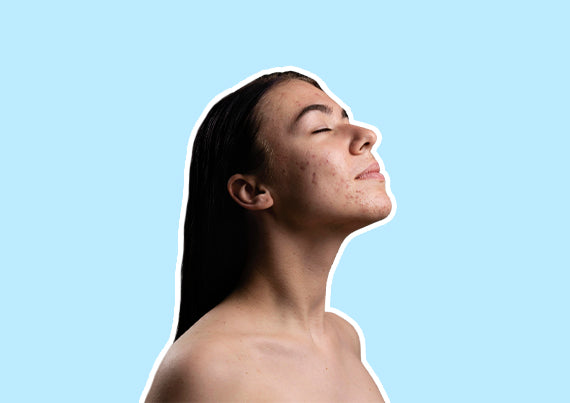Breaking the Silence: The Impact of Acne Stigma on Mental Health

Mirror, mirror on the wall, why does acne make us feel so small?
You know, acne—it's more than just a few pesky pimples. It's like this invisible weight we carry around, messing with our heads and our hearts. People don't always get it, but acne can mess with your mind. It's like, you're constantly battling not just the breakouts on your skin, but also the judgments and misconceptions from others. And let's be real, society's beauty standards don't make it any easier. It's like we're all supposed to fit into this perfect little box of flawless skin, but that's just not reality for most of us. But you know what? It's time to shine a light on this whole acne stigma thing. Because the more we talk about it, the more we can break down those walls of judgment and show some love and understanding to those of us living with acne.
The Reality of Acne Stigma
It's wild how something as common as acne can carry such a heavy load of stigma. It's like society's got this whole rulebook on what perfect skin should look like, and if you don't fit the mold, you're left feeling like you've missed the memo. But here's the thing—acne doesn't discriminate. It doesn't care if you're young or old, rich or poor, it just shows up uninvited and wreaks havoc on your confidence. Don't even get me started on the myths! People think acne is caused by eating too much chocolate or not washing your face enough, but come on, it's way more complicated than that. And let's talk about the media for a second. Ever noticed how every skincare ad features models with flawless, airbrushed skin? It's like they're saying, "If you don't look like this, you're not good enough." But you know what? It's time to flip the script. We need to challenge these ridiculous standards and show some love and understanding to anyone dealing with acne. Because at the end of the day, acne doesn't define you—it's just a tiny part of who you are.
The Psychological Toll of Acne Stigma
Acne stigma is a significant psychological issue that can lead to feelings of shame, embarrassment, and self-consciousness. This stigma can affect individuals in various aspects of their lives, from personal relationships to professional pursuits, and can have lasting effects on mental health and well-being. Shame and self-blame are common feelings experienced by individuals with acne, who internalize societal judgments and misconceptions about the condition. This can erode self-esteem and self-worth, making it difficult to feel confident or worthy of acceptance. Additionally, acne stigma can trigger intense feelings of embarrassment and self-consciousness in social situations, leading to avoidance of social interactions or public settings. Personal anecdotes and real-life examples illustrate the emotional impact of acne-related stigma. Surbhi, a teenager with severe acne, felt constantly overshadowed by her condition, leading her to withdraw from social activities and isolate herself from her peers. Asif, a young professional, faced workplace challenges due to his acne, and feeling overlooked for opportunities and promotions. This constant scrutiny and judgment took a toll on his confidence and mental well-being, leading to feelings of frustration and despair.
The psychological toll of acne stigma is significant, as it leaves individuals grappling with feelings of shame, embarrassment, and self-consciousness that can significantly impact their self-esteem, social interactions, and overall quality of life. Sharing personal anecdotes and real-life examples can help raise awareness and foster empathy within society.
The Link Between Acne Stigma and Mental Health
Acne stigma is a significant factor in mental health issues such as anxiety, depression, and low self-esteem. The stigma surrounding acne amplifies feelings of shame, embarrassment, and self-consciousness, leading to heightened psychological distress. The constant fear of judgment and rejection in social settings can exacerbate existing anxiety and depression symptoms, creating a vicious cycle of negative emotions and mental distress. It is also closely linked to low self-esteem, particularly in adolescents and young adults. Research shows that individuals with acne are more likely to report lower levels of self-esteem and self-worth compared to their peers without acne. The visible nature of acne lesions and societal pressure to conform to unrealistic beauty standards contribute to feelings of inadequacy and self-doubt, impacting their ability to navigate relationships, pursue goals, and engage in daily activities.
Research findings highlight the profound impact of acne stigma on mental health. A recent study found that individuals with acne were significantly more likely to experience symptoms of depression and anxiety compared to those without acne. Another study reported that acne severity was positively correlated with symptoms of depression and anxiety. The link between acne stigma and mental health issues is undeniable. Research findings highlight the urgent need for greater awareness, empathy, and support for individuals affected by acne. Addressing the underlying stigma and promoting a culture of acceptance and inclusivity can help improve the mental well-being of all individuals, regardless of their skin condition.
Challenging Societal Perceptions
Dealing with acne stigma and learning to love yourself is like trying to untangle a bunch of knotted wires—it takes time, effort, and a whole lot of patience. But hey, we've got this! First things first, let's show ourselves some love. Instead of beating ourselves up over a few pimples, let's give ourselves a break and practice a little self-compassion. And you know what? A good skincare routine never hurts anyone! Whether it's slathering on some moisturizer or breaking a sweat with a workout, taking care of ourselves can do wonders for our confidence. And when things get tough, it's okay to lean on our support system. Whether it's a chat with a trusted friend or a heart-to-heart with a therapist, reaching out for help can make all the difference. And hey, if you're feeling like you're the only one going through this, think again! There are tons of online communities and support groups full of people who get what you're going through and are ready to lend a listening ear. So let's take a deep breath, show ourselves some kindness, and remember that we're all in this together.
We at Teenilicious advocate for greater awareness and empathy towards those affected by acne, educating others about the realities of living with acne, dispelling myths and misconceptions, and promoting empathy and understanding of individuals' experiences. Open and honest conversations about acne can break down barriers and foster greater acceptance and support for those affected. To combat unattainable beauty standards and promote diversity in appearance, we must advocate for inclusive portrayal in the media and advertising. We may try to destigmatize acne and build a more accepting and supportive culture for everybody by normalizing a variety of skin types and encouraging acceptance of flaws as a normal part of the human experience.
Empowering Acne Warriors
Acne-related stigma can hinder individuals' confidence and self-acceptance. To overcome this stigma, individuals need access to resources and support networks that offer guidance, validation, and solidarity. Online communities, such as Reddit's r/SkincareAddiction and Acne.org's message boards, provide a sense of belonging and understanding for those facing similar challenges. Seeking support from mental health professionals, such as therapists, counsellors, and support groups, can help manage negative thoughts and emotions related to acne. Online therapy platforms like BetterHelp or Talkspace offer convenient options for individuals to access professional support from their homes. Self-help resources, such as books, podcasts, and online courses, can help boost self-esteem and cultivate self-acceptance. Recommended resources include "The Body Is Not an Apology" by Sonya Renee Taylor, "The Confidence Gap" by Russ Harris, and podcasts like "The BodyLove Project" and "The Confidence Chronicles."
Peer support, such as social media platforms like Instagram or TikTok, can foster a sense of community and empowerment. Hosting virtual or in-person support groups or meetups can also provide opportunities for individuals to forge meaningful connections and offer mutual support and encouragement. By providing access to resources and support networks, encouraging open dialogue, and promoting self-advocacy and empowerment, individuals can take proactive steps towards reclaiming their confidence, embracing their unique beauty, and navigating their journey towards self-acceptance and well-being.
The fight against acne stigma requires a concerted effort to challenge societal attitudes and foster empowerment and self-acceptance. This stigma perpetuates harmful stereotypes and unrealistic beauty standards, leading to feelings of shame, embarrassment, and self-consciousness among those affected. By providing access to resources, support networks, open dialogue, and advocating for greater awareness, we can work towards destigmatising acne and creating a more inclusive society. Prioritizing self-care, seeking support from trusted sources, and challenging negative beliefs about one's worth based on appearance are essential steps towards self-acceptance and empowerment. Embracing skincare products specifically designed for teenage skincare issues, such as Teenilicious, can offer scientifically proven efficacy and cruelty-free, natural ingredients. Readers can embrace their skin and fight stigma together by reiterating the message of empowerment and self-acceptance. This will help to create a society in which acne is seen as a normal aspect of life that deserves understanding, compassion, and support.











